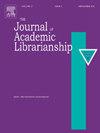Scaffolding AI literacy: An instructional model for academic librarianship
IF 2.3
3区 管理学
Q2 INFORMATION SCIENCE & LIBRARY SCIENCE
引用次数: 0
Abstract
As artificial intelligence (AI) becomes integral to academic, professional, and societal contexts, the demand for AI literacy in higher education is growing. Academic librarians, with their expertise in information literacy and critical pedagogy, are well-equipped to address this need. This article introduces a scaffolded model to advance AI literacy through progressive skill development across four tiers: foundational awareness, applied problem-solving, critical evaluation, and ethical advocacy. Each tier builds on the previous, fostering a comprehensive understanding of AI concepts, tools, and societal implications. Adapted from traditional information literacy workshops, this instructional model empowers students to navigate, critique, and responsibly engage with AI technologies. Tier 1 introduces basic AI concepts and tools. Tier 2 examines AI's role in research and problem-solving, addressing practical applications and limitations. Tier 3 emphasizes the critical evaluation of AI-generated content and tools. Tier 4 focuses on ethical decision-making and advocacy, encouraging students to consider AI's broader societal impacts. This article discusses the proposed model's pedagogical design, details its application through workshop plans, and explores its implications for academic librarians' roles in fostering AI literacy. By implementing this approach, librarians can equip students to become critical consumers of AI technologies.
脚手架人工智能素养:一种学术图书馆教学模式
随着人工智能(AI)成为学术、专业和社会环境不可或缺的一部分,高等教育对人工智能素养的需求正在增长。学术图书馆员在信息素养和批判教学法方面具有专业知识,能够很好地满足这一需求。本文介绍了一个框架模型,通过四个层次的渐进式技能发展来提高人工智能素养:基础意识、应用问题解决、批判性评估和道德倡导。每一层都建立在前一层的基础上,培养对人工智能概念、工具和社会影响的全面理解。这种教学模式改编自传统的信息素养研讨会,使学生能够驾驭、批评和负责任地参与人工智能技术。第1层介绍基本的AI概念和工具。第2层探讨了人工智能在研究和解决问题中的作用,解决了实际应用和局限性。第三层强调对人工智能生成的内容和工具进行批判性评估。第四层侧重于道德决策和倡导,鼓励学生考虑人工智能更广泛的社会影响。本文讨论了提出的模型的教学设计,详细介绍了其通过研讨会计划的应用,并探讨了其对学术图书馆员在培养人工智能素养方面的作用的影响。通过实施这种方法,图书馆员可以使学生成为人工智能技术的关键消费者。
本文章由计算机程序翻译,如有差异,请以英文原文为准。
求助全文
约1分钟内获得全文
求助全文
来源期刊

Journal of Academic Librarianship
INFORMATION SCIENCE & LIBRARY SCIENCE-
CiteScore
5.30
自引率
15.40%
发文量
120
审稿时长
29 days
期刊介绍:
The Journal of Academic Librarianship, an international and refereed journal, publishes articles that focus on problems and issues germane to college and university libraries. JAL provides a forum for authors to present research findings and, where applicable, their practical applications and significance; analyze policies, practices, issues, and trends; speculate about the future of academic librarianship; present analytical bibliographic essays and philosophical treatises. JAL also brings to the attention of its readers information about hundreds of new and recently published books in library and information science, management, scholarly communication, and higher education. JAL, in addition, covers management and discipline-based software and information policy developments.
 求助内容:
求助内容: 应助结果提醒方式:
应助结果提醒方式:


